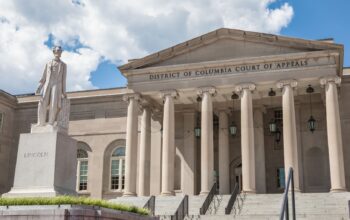On Inauguration Day, President Donald Trump signed into action 20 executive orders, the most of any president on their first day in office. As of Feb. 26, he signed over 70 executive orders in his first month in office.
These recent executive orders demonstrate a pattern of tearing down protections and practices designed to address the racial inequality African Americans historically and continuously face. Among this outburst of executive power are orders that undermine advances made in environmental justice, equal hiring practices, anti-discrimination laws, equal sentencing laws, and health disparities.
The dismantling of these crucial protections is not just a rollback of policies; it is a rollback in our advancement. Following decades of hard-fought civil rights, economic opportunity, and environmental justice, Black communities are now exposed to increased threats of discrimination, economic insecurity and environmental devastation. These executive actions do not simply undo past progress, they actively reinforce systemic inequalities that have long marginalized Black Americans. This is an unprecedented moment calling for an urgent, collective response from lawmakers, activists and citizens to resist these reversals and demand policies that protect and uplift Black communities.
Following the brave efforts of men and women across the country, the Civil Rights Act of 1964 was passed, marking a significant step towards long overdue legal racial equality. Further efforts were enacted to address areas of long-held racial inequality, such as racial discrimination in hiring. Executive Order 11246, titled “Equal Employment Opportunity,” was necessary for President Lyndon Johnson’s efforts to tear down racial segregation in the nation. This order had three primary parts: Nondiscrimination in Government Employment, Nondiscrimination in Employment By Government Contractors and Subcontractors, and Nondiscrimination.
This order was part of a long history of the federal government leading in anti-discriminatory policies, making government employment an attractive option for Black Americans who found greater civil rights protections in federal government jobs than in the private sector. In 1961, African Americans were about 13% of the federal workforce, though only 10.5% of the population. By 1980, Black Americans were 17% of the federal workforce.
On Jan. 21, President Trump signed an executive order rescinding Executive Order 11246, Equal Employment Opportunity, potentially weakening the largest employer in the United States, the federal government. This sector of the economy provides the most substantial employment opportunities and civil rights protections, helping millions of Americans. The Trump administration’s focus on making large cuts in the federal workforce could also have a disproportionately harmful impact on the African American community, which already faces lower income levels, higher unemployment rates, and overall economic insecurity than other racial and ethnic groups in the United States.
In addition to ending President Johnson’s Equal Employment Opportunity order, President Trump issued Executive Order 14151 “Ending Radical and Wasteful Government DEI Programs and Preferencing” which demands that all federal agencies no longer develop equity action plans designed to address discrimination and the lack of representation of minority groups.
President Trump also rescinded Executive Order 12898, titled “Federal Actions to Address Environmental Justice in Minority Populations and Low-Income Communities,” which was signed by President Bill Clinton in 1994. This order mandated federal agencies to identify and address environmental issues that target communities of color and low-income communities. This order was established to support vulnerable communities by reducing their exposure to hazardous chemicals, industrial chemicals, and hazardous substances, disproportionately affecting Black communities over time.
African American communities have disproportionately faced environmental hazards, including lead poisoning, polluted air and water, and proximity to sites where hazardous substances are processed. The NAACP Center for Environmental and Climate Justice found that race is the leading predictor of toxic facility placement. The revocation of Executive Order 12898 removes a critical protection for federal intervention to help communities from environmental pollutants. Studies indicate that Black American communities are more likely to be located near highways, factories and landfills, contributing to higher rates of asthma and pollution-related illnesses. Black children are hospitalized for asthma at twice the rate of white children and suffer quadruple the asthma-related death rate. Without the protections of Executive Order 12898, the risk of similar environmental injustices increases, with even less accountability from federal agencies.
African Americans cannot afford to remain passive in the face of these challenges. Activists, lawmakers and citizens alike have to join hands to fight these reversals and push through laws in their towns and states that reflect ideals of fairness and justice. Black communities should demand corporations to be responsible for the poisons that spew in their communities, to support elected representatives who promise to reinstate essential protections, and to continue to fight to obtain policies that ensure equal job potential and environmental protections.
History imparts an essential lesson: Progress is not given to us; it is achieved through struggle and determination. As earlier generations fought against discriminatory recruitment practices, environmental disregard, and institutionalized injustices, this generation must continue to do so with unwavering determination and relentless resilience. Reversing these executive orders is an impediment to our work, not an indication of defeat. Black communities and allies can work in concert to reinstate these essential protections through collective organization, mobilization, and an unwavering insistence upon a future in which justice, equity and opportunity are universal core values.
Asante-Muhammad is president of Joint Center for Political and Economic Studies. De La Torre and Lindsey are interns at University of California DC.
Source: Published without changes from Washington Informer Newspaper




